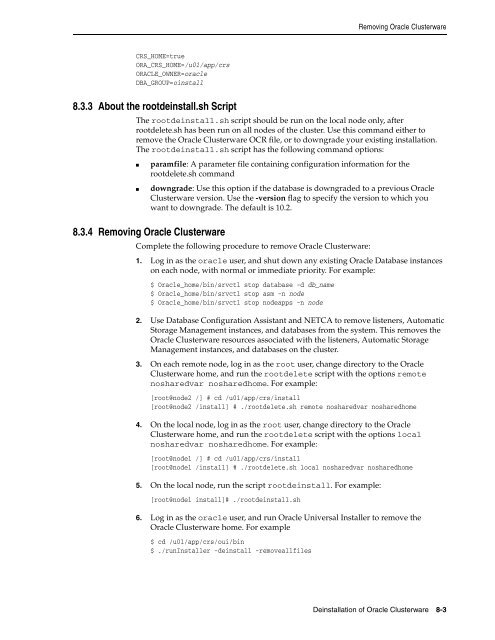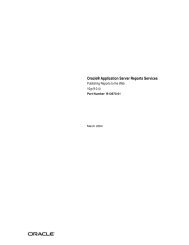Oracle Database Oracle Clusterware Installation Guide for HP-UX
Oracle Database Oracle Clusterware Installation Guide for HP-UX
Oracle Database Oracle Clusterware Installation Guide for HP-UX
Create successful ePaper yourself
Turn your PDF publications into a flip-book with our unique Google optimized e-Paper software.
CRS_HOME=true<br />
ORA_CRS_HOME=/u01/app/crs<br />
ORACLE_OWNER=oracle<br />
DBA_GROUP=oinstall<br />
8.3.3 About the rootdeinstall.sh Script<br />
Removing <strong>Oracle</strong> <strong>Clusterware</strong><br />
The rootdeinstall.sh script should be run on the local node only, after<br />
rootdelete.sh has been run on all nodes of the cluster. Use this command either to<br />
remove the <strong>Oracle</strong> <strong>Clusterware</strong> OCR file, or to downgrade your existing installation.<br />
The rootdeinstall.sh script has the following command options:<br />
■ paramfile: A parameter file containing configuration in<strong>for</strong>mation <strong>for</strong> the<br />
rootdelete.sh command<br />
■ downgrade: Use this option if the database is downgraded to a previous <strong>Oracle</strong><br />
<strong>Clusterware</strong> version. Use the -version flag to specify the version to which you<br />
want to downgrade. The default is 10.2.<br />
8.3.4 Removing <strong>Oracle</strong> <strong>Clusterware</strong><br />
Complete the following procedure to remove <strong>Oracle</strong> <strong>Clusterware</strong>:<br />
1. Log in as the oracle user, and shut down any existing <strong>Oracle</strong> <strong>Database</strong> instances<br />
on each node, with normal or immediate priority. For example:<br />
$ <strong>Oracle</strong>_home/bin/srvctl stop database -d db_name<br />
$ <strong>Oracle</strong>_home/bin/srvctl stop asm -n node<br />
$ <strong>Oracle</strong>_home/bin/srvctl stop nodeapps -n node<br />
2. Use <strong>Database</strong> Configuration Assistant and NETCA to remove listeners, Automatic<br />
Storage Management instances, and databases from the system. This removes the<br />
<strong>Oracle</strong> <strong>Clusterware</strong> resources associated with the listeners, Automatic Storage<br />
Management instances, and databases on the cluster.<br />
3. On each remote node, log in as the root user, change directory to the <strong>Oracle</strong><br />
<strong>Clusterware</strong> home, and run the rootdelete script with the options remote<br />
nosharedvar nosharedhome. For example:<br />
[root@node2 /] # cd /u01/app/crs/install<br />
[root@node2 /install] # ./rootdelete.sh remote nosharedvar nosharedhome<br />
4. On the local node, log in as the root user, change directory to the <strong>Oracle</strong><br />
<strong>Clusterware</strong> home, and run the rootdelete script with the options local<br />
nosharedvar nosharedhome. For example:<br />
[root@node1 /] # cd /u01/app/crs/install<br />
[root@node1 /install] # ./rootdelete.sh local nosharedvar nosharedhome<br />
5. On the local node, run the script rootdeinstall. For example:<br />
[root@node1 install]# ./rootdeinstall.sh<br />
6. Log in as the oracle user, and run <strong>Oracle</strong> Universal Installer to remove the<br />
<strong>Oracle</strong> <strong>Clusterware</strong> home. For example<br />
$ cd /u01/app/crs/oui/bin<br />
$ ./runInstaller -deinstall -removeallfiles<br />
Deinstallation of <strong>Oracle</strong> <strong>Clusterware</strong> 8-3
















